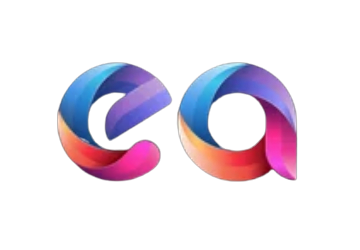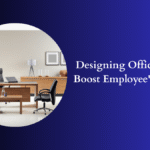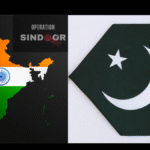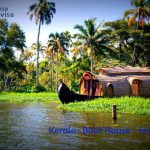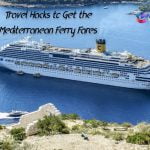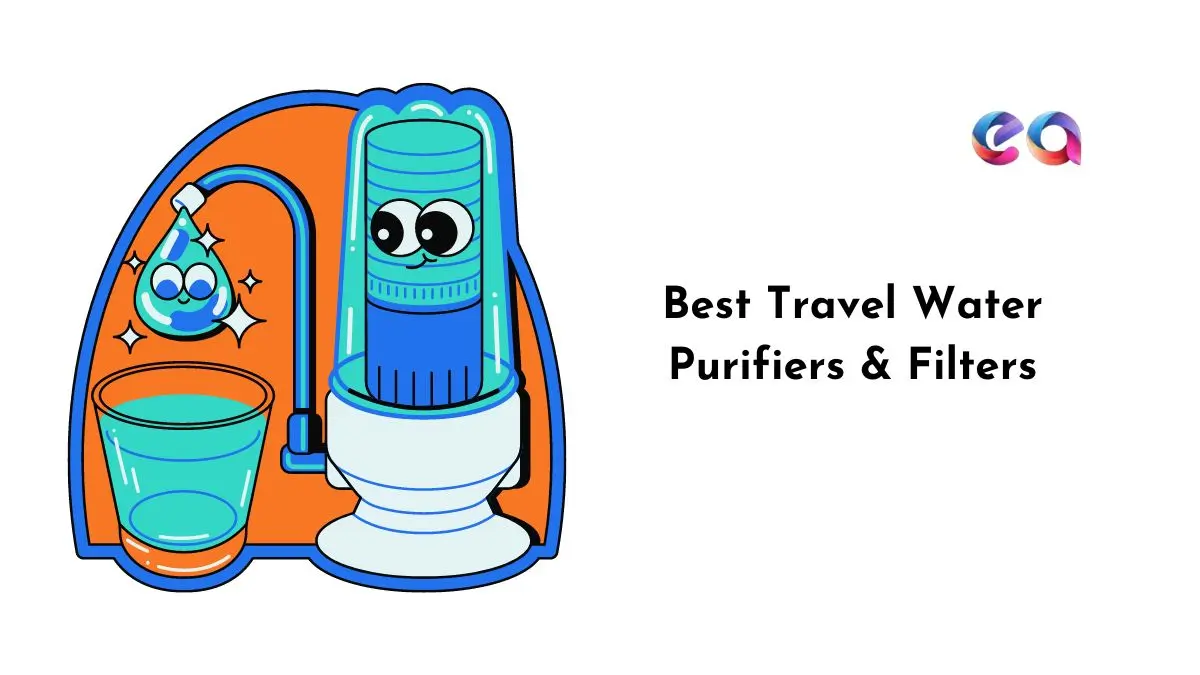
Traveling is a great way to explore new places, cultures, and experiences. But it also comes with some challenges, especially when it comes to finding clean and safe drinking water. Whether you’re hiking in the wilderness, camping in remote areas, or visiting developing countries, you may encounter water sources that are contaminated with harmful microorganisms, chemicals, or pollutants. Drinking such water can cause serious health problems, such as diarrhea, cholera, typhoid, and dysentery.
That’s why having a reliable travel water purifier or filter is essential for any traveler who wants to stay healthy and hydrated on their adventures. A travel water purifier or filter is a device that removes or kills the unwanted substances from untreated water, making it safe for human consumption. There are different types of travel water purifiers and filters, each with its own advantages and disadvantages. Some use physical filtration, such as membranes or activated carbon, to trap the contaminants. Others use chemical purification, such as chlorine or iodine, to disinfect the water. And others use ultraviolet (UV) light to destroy the pathogens.
Here I will review some of the best travel water purifiers and filters of 2023, based on their performance, convenience, durability, and value for money. We will also provide some tips on how to choose the right one for your needs and preferences.
Table of Contents
How to Choose a Travel Water Purifier or Filter:
Before we dive into the reviews of the best travel water purifiers and filters of 2023, let’s first look at some of the factors that you should consider when choosing one.
Filtration Technology:
The first thing you should look at is the filtration technology that the device uses. Different technologies have different capabilities and limitations in terms of what they can remove from the water. Here are some of the most common ones:
[Also Read: Best Camera Bags]
- Membrane filters: These are thin layers of material with tiny pores that allow water to pass through but block larger particles, such as bacteria, protozoa, and sediment. They are usually rated by their pore size in microns (µm), with smaller pores providing better protection. However, they can also clog faster and require more pressure to push the water through. Some examples of membrane filters are Sawyer Squeeze, Katadyn BeFree, and LifeStraw Personal Water Filter.
- Activated carbon filters: These are filters made of carbon granules or blocks that have a large surface area and can adsorb (stick to) organic compounds, such as pesticides, herbicides, chlorine, and bad tastes and odors. They can also reduce some heavy metals, such as lead and mercury. However, they cannot remove viruses or very small bacteria and protozoa. They also have a limited lifespan and need to be replaced regularly. Some examples of activated carbon filters are LifeStraw Go Water Filter Bottles and Platypus GravityWorks.
- Chemical purifiers: These are tablets or drops that contain chemicals, such as chlorine or iodine, that kill or inactivate microorganisms in the water. They are effective against viruses, bacteria, and protozoa, but they may leave a residual taste or smell in the water. They also take some time to work (usually 30 minutes to 4 hours) and may not be suitable for people with allergies or thyroid problems. Some examples of chemical purifiers are Chlorine Dioxide Drops & Pills and Aquamira Water Treatment Drops.
- UV purifiers: These are devices that use ultraviolet light to damage the DNA of microorganisms in the water, preventing them from reproducing or infecting you. They are effective against viruses, bacteria, and protozoa, but they do not remove any other contaminants from the water. They also require batteries or electricity to operate and may not work well in cloudy or turbid water. Some examples of UV purifiers are SteriPen Ultra UV Water Purifier and CrazyCap 2 UV Water Purifier.
[Also Read: Best Packing Cubes]
Flow Rate:
The flow rate is how fast the device can produce clean water from untreated water. It is usually measured in liters per minute (L/min) or gallons per minute (GPM). The higher the flow rate, the faster you can fill your bottle or container with purified water. However, higher flow rates may also mean lower filtration quality or shorter filter lifespan.
The flow rate depends on several factors, such as the filtration technology, the pore size of the filter, the pressure applied to the device (by gravity or by squeezing), the cleanliness of the filter (how often it is backflushed or cleaned), and the quality of the source water (how clear or dirty it is).
Generally speaking, gravity filters have higher flow rates than pump filters or squeeze filters because they use gravity to push the water through the filter without much effort from you. However, they also require more setup time and space to hang the filter and the bags. Squeeze filters have lower flow rates than gravity filters but higher than pump filters because they use your hand pressure to squeeze the water through the filter. However, they also require more physical effort and may tire your hand after a while. Pump filters have the lowest flow rates because they use a manual pump to force the water through the filter. However, they also give you more control over the amount and direction of the water.
Weight and Size:
Another factor to consider is the weight and size of the device. This is especially important if you are traveling light or backpacking, where every ounce and inch counts. You want a device that is compact, lightweight, and easy to pack and carry.
The weight and size of the device depend on the filtration technology, the capacity of the filter or the bottle, and the materials used to make the device. Generally speaking, chemical purifiers and UV purifiers are the lightest and smallest options because they do not have any bulky or heavy components. However, they also require additional items, such as batteries or water containers, to work. Membrane filters and activated carbon filters are heavier and larger than chemical purifiers and UV purifiers because they have physical filters that take up space and add weight. However, they also do not need any extra items to work.
Ease of Use:
The last factor to consider is the ease of use of the device. This refers to how simple and convenient it is to operate, maintain, and store the device. You want a device that is user-friendly, hassle-free, and durable.
The ease of use of the device depends on several factors, such as the filtration technology, the design of the device, the instructions provided by the manufacturer, and your personal preference. Generally speaking, chemical purifiers and UV purifiers are easy to use because they only require adding them to the water or stirring them with a wand. However, they also require following specific directions, such as waiting for a certain amount of time or avoiding exposure to sunlight. Membrane filters and activated carbon filters are easy to use because they only require filling them with water or attaching them to a bottle or a bag. However, they also require regular cleaning or backflushing to prevent clogging or reduce bacterial growth.
Best Travel Water Purifiers & Filters of 2023:
Now that we have covered some of the factors that you should consider when choosing a travel water purifier or filter, let’s look at some of the best options available on the market in 2023. We have selected these products based on their filtration technology, flow rate, weight and size, ease of use, customer reviews, and value for money.
LifeStraw Personal Water Filter:
The LifeStraw Personal Water Filter is one of the most popular and trusted travel water purifiers in the world. It is a simple but effective device that uses a membrane filter with a pore size of 0.2 µm to remove 99.999999% of bacteria (such as E. coli), 99.999% of parasites (such as Giardia), and 99.999% of microplastics from any freshwater source.
The LifeStraw Personal Water Filter is very easy to use: you just insert one end into the water source (such as a stream or a lake) and suck from the other end like a straw. The water passes through the filter and comes out clean and safe to drink. The device can filter up to 1,000 gallons (4,000 liters) of water before it needs to be replaced.
The LifeStraw Personal Water Filter is also very lightweight and compact: it weighs only 2 ounces (57 grams) and measures 9 x 1 x 1 inches (22 x 2.5 x 2.5 cm). It can fit easily in your backpack, pocket, or emergency kit. It also comes with a lanyard for easy carrying around your neck.
The LifeStraw Personal Water Filter is ideal for travelers who want a simple but reliable way to purify water from any freshwater source without using chemicals or batteries. It is also great for hikers, campers, survivalists, and humanitarian workers who need access to safe drinking water in remote areas or emergency situations.
Pros:
- Simple but effective membrane filter
- Removes bacteria, parasites, and microplastics
- Easy to use: just suck like a straw
- Lightweight and compact
- Long-lasting: can filter up to 1,000 gallons (4,000 liters) of water
- No chemicals or batteries required
- Comes with a lanyard for easy carrying
Cons:
- Does not remove viruses or chemicals
- Does not improve taste or odor
- May clog over time if not cleaned properly
- May freeze in cold temperatures
Link: https://amzn.to/44xC4Jn
Grayl Geopress Water Purifier Bottle:
The Grayl Geopress Water Purifier Bottle is a versatile and effective device that uses a combination of physical and chemical filtration to purify water from any source. It is ideal for backpackers who want a fast and easy way to get clean water without pumping, squeezing, or waiting.
The Grayl Geopress Water Purifier Bottle uses a patented technology that consists of an outer refill cup and an inner press cup. The outer refill cup has a replaceable purifier cartridge that contains a triple-layer filter media: an ion exchange layer that removes heavy metals, chemicals, and viruses; an ultra-powdered activated carbon layer that removes bad tastes, odors, and organic compounds; and an electroadhesion layer that removes bacteria, protozoa, and particulates. The inner press cup has a silicone grip and a one-press button that allows you to press the purified water into the cup.
The Grayl Geopress Water Purifier Bottle is very easy to use: you just fill the outer refill cup with water, insert the inner press cup, and press down with your body weight. The water passes through the purifier cartridge and comes out clean and safe to drink in 8 seconds. The device can purify up to 24 ounces (710 ml) of water per press and up to 65 gallons (250 liters) of water per cartridge.
The Grayl Geopress Water Purifier Bottle is also very durable and ergonomic: it is made of BPA-free plastic that is impact-resistant and drop-tested. It has a soft-touch lid with a secure lock that prevents leaks and spills. It also has a top carry loop for easy attachment to your backpack or belt.
The Grayl Geopress Water Purifier Bottle is perfect for backpackers who want a convenient and portable way to purify water from any source without using batteries or chemicals. It is also great for travelers, adventurers, and humanitarian workers who need access to safe drinking water in remote areas or emergency situations.
Pros:
- Versatile and effective purifier cartridge
- Removes heavy metals, chemicals, viruses, bacteria, protozoa, particulates, bad tastes, and odors
- Easy to use: just fill and press
- Fast: purifies 24 ounces (710 ml) of water in 8 seconds
- Durable and ergonomic
- Leak-proof lid with secure lock
- Top carry loop for easy attachment
Cons:
- Expensive
- Heavy
- May require more force to press in turbid water
Price: $89.95
Link: https://amzn.to/3DlWTf6
Sawyer Products Squeeze Water Filtration System:
The Sawyer Products Squeeze Water Filtration System is a simple but effective device that uses a membrane filter with a pore size of 0.1 µm to remove 99.99999% of bacteria and 99.9999% of protozoa from any freshwater source. It is ideal for backpackers who want a lightweight and adaptable way to filter water without using chemicals or batteries.
The Sawyer Products Squeeze Water Filtration System consists of a hollow-fiber membrane filter and a set of reusable squeeze pouches. The filter has a high flow rate and can be attached to the squeeze pouches, standard water bottles, hydration bladders, or even used as a straw. The squeeze pouches come in different sizes: 16 ounces (473 ml), 32 ounces (946 ml), and 64 ounces (1.9 liters). The filter can filter up to 100,000 gallons (378,541 liters) of water before it needs to be replaced.
The Sawyer Products Squeeze Water Filtration System is very easy to use: you just fill the squeeze pouch with water, screw on the filter, and drink from the mouthpiece or squeeze the water into another container. The filter can be backflushed with the included syringe to restore its flow rate and prevent clogging.
The Sawyer Products Squeeze Water Filtration System is also very lightweight and compact: the filter weighs only 3 ounces (85 grams) and measures 5 x 1.75 inches (12.7 x 4.4 cm). The squeeze pouches are collapsible and can be rolled up when not in use. The system also comes with a mesh carrying pouch for easy storage.
The Sawyer Products Squeeze Water Filtration System is perfect for backpackers who want a simple but reliable way to filter water from any freshwater source without using chemicals or batteries. It is also great for hikers, campers, survivalists, and humanitarian workers who need access to safe drinking water in remote areas or emergency situations.
Pros:
- Simple but effective membrane filter
- Removes bacteria and protozoa
- High flow rate
- Adaptable: can be attached to various containers or used as a straw
- Lightweight and compact
- Long-lasting: can filter up to 100,000 gallons (378,541 liters) of water
- Easy to backflush
Cons:
- Does not remove viruses or chemicals
- Does not improve taste or odor
- Squeeze pouches may leak or burst
Price: $29.97
Link: https://amzn.to/3Dj25Qz
Katadyn BeFree 0.6L:
The Katadyn BeFree 0.6L is a compact and lightweight device that uses a membrane filter with a pore size of 0.1 µm to remove 99.9999% of bacteria and 99.9% of protozoa from any freshwater source. It is ideal for thru-hikers who want a fast and easy way to filter water without carrying extra weight or bulk.
The Katadyn BeFree 0.6L consists of a hollow-fiber membrane filter and a collapsible soft flask. The filter has a high flow rate and can be attached to the soft flask or any standard water bottle or hydration bladder. The soft flask has a capacity of 20 ounces (600 ml) and is made of durable, BPA-free TPU that is abrasion-resistant and flexible. The filter can filter up to 264 gallons (1,000 liters) of water before it needs to be replaced.
The Katadyn BeFree 0.6L is very easy to use: you just fill the soft flask with water, screw on the filter, and drink from the mouthpiece or squeeze the water into another container. The filter can be cleaned by swishing it in water or shaking it vigorously.
The Katadyn BeFree 0.6L is also very lightweight and compact: the filter weighs only 2 ounces (58 grams) and measures 2.73 x 9.05 inches (6.9 x 23 cm). The soft flask can be folded or rolled up when not in use. The system also comes with a carry loop for easy attachment to your backpack or belt.
The Katadyn BeFree 0.6L is perfect for thru-hikers who want a convenient and portable way to filter water from any source without adding much weight or bulk to their pack. It is also great for runners, bikers, and travelers who need access to safe drinking water on the go.
Pros:
- Compact and lightweight
- High flow rate
- Removes bacteria and protozoa
- Easy to use: just fill and drink
- Collapsible soft flask
- Easy to clean
Cons:
- Does not remove viruses or chemicals
- Does not improve taste or odor
- Soft flask may leak or puncture
Price: $39.95
Link: https://amzn.to/3K0siY7
Conclusion:
The best travel water purifier for you will depend on your individual needs and preferences. If you are looking for a simple and affordable option, the LifeStraw Personal Water Filter is a great choice. If you need a more versatile and effective device, the Grayl Geopress Water Purifier Bottle is a good option. And if you are looking for a compact and lightweight filter that is easy to use, the Sawyer Squeeze Water Filter is a good choice.
No matter which travel water purifier you choose, make sure to use it properly to ensure that you are getting safe and clean drinking water.
Here are some additional tips for choosing a travel water purifier or filter:
- Consider the type of water you will be filtering. If you will be filtering water from streams, lakes, or rivers, you will need a filter that can remove bacteria, parasites, and microplastics. If you will be filtering water from municipal sources, you may only need a filter that removes chlorine and other chemicals.
- Consider the flow rate of the filter. The flow rate is how fast the filter can produce clean water. A higher flow rate means that you can fill your bottle or container with clean water faster. However, a higher flow rate may also mean a lower filtration quality or shorter filter lifespan.
- Consider the weight and size of the filter. If you are backpacking, you will want a filter that is lightweight and compact. However, if you are traveling for a longer period of time, you may want a filter that has a larger capacity.
- Consider the ease of use of the filter. Make sure that the filter is easy to use, especially if you are not familiar with water purification.
- Consider the cost of the filter. Travel water purifiers and filters can range in price from around $20 to $200. Choose a filter that fits your budget and your needs.
By following these tips, you can choose the best travel water purifier or filter for your needs and ensure that you have safe and clean drinking water on your travels.thumb_upthumb_downtuneshareGoogle it
